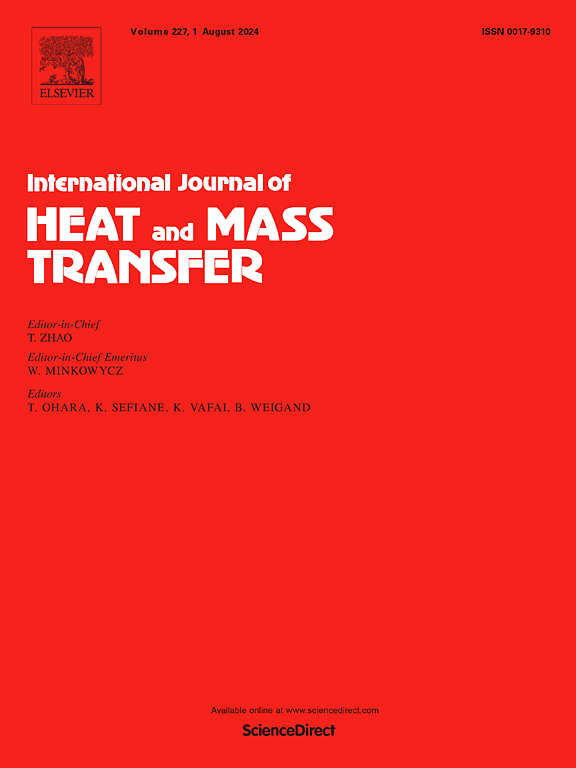A molecular dynamic study of boiling heat transfer on liquid metal surfaces with different wettability
IF 5
2区 工程技术
Q1 ENGINEERING, MECHANICAL
International Journal of Heat and Mass Transfer
Pub Date : 2025-04-20
DOI:10.1016/j.ijheatmasstransfer.2025.127127
引用次数: 0
Abstract
The boiling process of water layers over liquid metal surfaces with different wettability was simulated using molecular dynamic techniques in order to examine the impact and processes of the wettability of liquid metal (liquid gallium) on boiling heat transfer. The influence mechanism of wettability on boiling heat transfer was examined using the snapshots of the water film boiling, motion state, the energy cloud diagram, bubble nucleation volume, heat flux, and interface thermal resistance. The findings showed that the boiling heat transfer performance may be greatly enhanced by the highly wettable liquid metal surface, resulting in increased heating rate and heat flux as well as earlier bubble nucleation and quicker boiling. Highly wettable liquid metal exhibits strong fluctuation, with water molecules having significant kinetic energy and potential energy, resulting in a shorter boiling time. Liquid metal with higher wettability has smaller Kapitza thermal resistances, which can produce higher temperatures and heat flux and improve boiling heat transfer. The findings offer fresh concepts and techniques for improving boiling heat transfer while also illuminating the fundamental mechanics underlying variations in boiling heat transfer on liquid metal surfaces with different wettability.
不同润湿性液态金属表面沸腾传热的分子动力学研究
采用分子动力学方法模拟了不同润湿性金属表面水层的沸腾过程,研究了金属润湿性(液态镓)对沸腾传热的影响及其过程。通过水膜沸腾、运动状态、能量云图、气泡成核体积、热流密度、界面热阻等指标考察了润湿性对沸腾传热的影响机理。结果表明,金属液表面具有较强的可湿性,大大提高了沸腾换热性能,提高了加热速率和热流密度,使气泡成核时间提前,沸腾速度加快。高可湿性液态金属表现出强烈的波动,水分子具有显著的动能和势能,导致沸腾时间较短。润湿性较高的液态金属具有较小的Kapitza热阻,可以产生更高的温度和热流密度,改善沸腾传热。这些发现为改善沸腾传热提供了新的概念和技术,同时也阐明了不同润湿性液态金属表面沸腾传热变化的基本力学。
本文章由计算机程序翻译,如有差异,请以英文原文为准。
求助全文
约1分钟内获得全文
求助全文
来源期刊
CiteScore
10.30
自引率
13.50%
发文量
1319
审稿时长
41 days
期刊介绍:
International Journal of Heat and Mass Transfer is the vehicle for the exchange of basic ideas in heat and mass transfer between research workers and engineers throughout the world. It focuses on both analytical and experimental research, with an emphasis on contributions which increase the basic understanding of transfer processes and their application to engineering problems.
Topics include:
-New methods of measuring and/or correlating transport-property data
-Energy engineering
-Environmental applications of heat and/or mass transfer

 求助内容:
求助内容: 应助结果提醒方式:
应助结果提醒方式:


